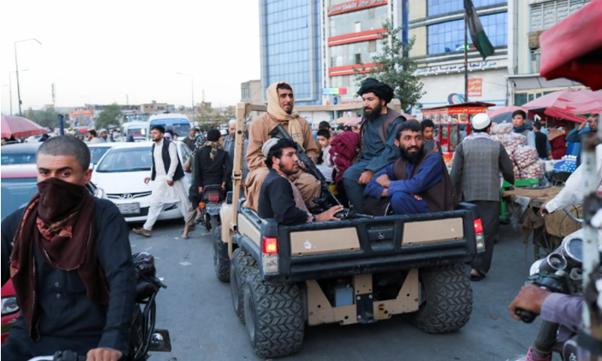The rise of the Taliban has ramifications ripple effects directly and indirectly for the entire region, especially for the neighbourhood. Countries such as Bangladesh and India have to face this eternal extremist threat with iron determination and resolve. The regime in Kabul has the blessings of the neighbouring deep state of Pakistan, who acted as a facilitator and midwife for this takeover.
Primarily, there are four direct threats, including increased attempts by local extremists to travel for operational and combat training in the safe haven of Afghanistan. There will be a heightened risk of radicalization in the proscribed organizations and additional popular traction in those sections. A revival, rejuvenation and reconfiguration of local terrorist groups and networks that can ride on newfound enthusiasm and carry out new attacks of carnage. Lastly, International groups like Al Qaeda & ISIS will have growing influence over local militants. A new generation of younger and highly trained terrorists can inflict brutal atrocities globally in the longer term.
The inspiration which is resonated from Kabul can create replicate their tactics and modus operandi amongst these regionally motivated groups. Although the law enforcement agencies of Bangladesh have a significantly scaled up counter-terrorism wing and insurgent capabilities, it must continue on its efforts to prevent any minute spillover. They will also need to regularly monitor and check the recruitment process in which foreign travels via the third country cannot be ruled out for the purposes of training. All of this requires rigorous surveillance, adequate border security and international collaborations with multiple organizations to ensure that free flow of information and effective red-flagging can be carried out promptly.
In the 1970s, both Bangladesh and Afghanistan faced war, the former to secure its liberation from Pakistan and the latter caught in a civil war between the communist government backed by the Soviets and the anti-communist Islamist guerrillas known as the Mujahideen. Whilst the freedom struggle war in Bangladesh lasted nine months; It raged for almost nine years in Afghanistan, reducing it to rubbles. Bangladesh was led by the charismatic and progressive Sheikh Mujubir Rahman, who prioritized the development agenda after independence, putting the country on a trajectory of growth and prosperity through the pluralistic values of socialism & secularism at its core.
The picture was entirely different in Afghanistan. The Taliban, upholding their beliefs in the Sharia law, implemented a medieval system of justice and governance, resulting in widespread brutality and destruction. Women and children were worst affected under the first six years of the rule. Their education to employment was prohibited, and a rigorous restriction regime was inflicted upon them, including freedom of movement to their way of dressing. However, in contrast, women in Bangladesh have been the key drivers of the country’s global emergence as an economic power. The readymade garment sector, the backbone of Bangladesh’s foreign exports, is powered mainly by women.
It is also fair to say that Bangladesh’s evolution has not been smooth sailing, and the country has had a multitude of attacks from Islamic insurgent groups. For example, a Taliban inspired local radical network-Harkat-ul Jihad-al-Islami Bangladesh, was held responsible for several terrorist attacks, including the 2004 grenade attack on the AL rally, from which Sheikh Hasina barely survived. Since Prime Minister Hasina came to power in 2009, Bangladesh has been successful in curbing the rise of terrorist threats both inside and transpiring outside the international borders. The negation of radicalization within the Society of Bangladesh has given the dividends of economic and political stability and commercial prosperity.
At the heart of the Bangladeshi government, success is rooted the support of the majority which it enjoys throughout the country and the founding principles of its founding father. In contrast, unfortunately, this cannot be inferred for Afghanistan, where a democratically elected government that was heavily relying on Western powers collapsed like a House of Cards under the Taliban.
In conclusion, the rise of the Taliban has several direct and indirect ramifications for the entire region and Bangladesh. The terrorist landscape can change as there were historical linkages between splinter groups in Bangladesh and Afghanistan. These groups still harbour the farfetched dream of transforming Bangladesh into a theocratic state with hard-line values borrowed from the Taliban at its core. These groups also have a very fertile recruiting ground in which they can corrupt and pollute young minds with the message of hate and disharmony. The success of the Taliban could potentially serve as a blueprint leading to their own aspirational and operational achievements, which they might have sight of. Overall, Bangladesh has made commendable progress in counter-terrorism, and the country is very well equipped to fight terrorism in all shapes and forms. Any surge in the support for the Taliban and its values may endanger the country’s success in the global world order and may reverse the dividends it had earned over the last few decades. Stricter border controls and effectively monitoring any recruitment process are crucial to preventing such catastrophic events in the future. Countering violent extremism by focusing on monitoring protocols and curtailing extremist activity, especially on popular social media platforms, could hold the ultimate key in this battle of ideologies.
















